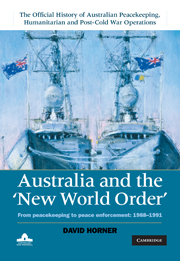Book contents
- Frontmatter
- Contents
- List of maps
- Preface
- Chronology 1987–91
- Abbreviations
- PART 1 STRATEGY AND POLICY
- 1 Towards a ‘new world order’
- 2 Responding to a new world order
- PART 2 NEW MAJOR PEACE OPERATIONS
- PART 3 THE FIRST GULF WAR
- Conclusion
- Appendix A Australian participation in multinational peacekeeping operations, 1947–2007
- Appendix B Key United Nations Security Council resolutions and statements
- Appendix C Investigations into chemical warfare in the Iran–Iraq War, 1984–87 by Daniel Flitton
- Appendix D Gulf War syndrome by Rosalind Hearder
- Appendix E Major office bearers, 1987–96
- Bibliography
- Index
2 - Responding to a new world order
Australia's policy towards overseas deployments and peacekeeping: 1988–91
from PART 1 - STRATEGY AND POLICY
Published online by Cambridge University Press: 05 June 2012
- Frontmatter
- Contents
- List of maps
- Preface
- Chronology 1987–91
- Abbreviations
- PART 1 STRATEGY AND POLICY
- 1 Towards a ‘new world order’
- 2 Responding to a new world order
- PART 2 NEW MAJOR PEACE OPERATIONS
- PART 3 THE FIRST GULF WAR
- Conclusion
- Appendix A Australian participation in multinational peacekeeping operations, 1947–2007
- Appendix B Key United Nations Security Council resolutions and statements
- Appendix C Investigations into chemical warfare in the Iran–Iraq War, 1984–87 by Daniel Flitton
- Appendix D Gulf War syndrome by Rosalind Hearder
- Appendix E Major office bearers, 1987–96
- Bibliography
- Index
Summary
By 1988 Australia had been sending military personnel and police to UN and other peacekeeping missions for more than forty years, and claimed a proud, if limited, record of contributing to UN peacemaking and peacekeeping endeavours. In emphasising this point, Australian government ministers and senior public servants often recalled the role of the former Australian Foreign minister, Dr H.V. Evatt, in helping to establish the United Nations, and noted that when it adopted the Universal Declaration of Human Rights in 1948, he was President of the General Assembly. In March 1988, for example, Australia's Ambassador to the United Nations, Richard Woolcott, claimed that Australia ‘stood tall’ internationally and was ‘generally regarded within the United Nations as a decent, helpful, constructive and responsible influence in the international community and as a country which pursues an independent foreign policy, within the framework of our alliance with the United States. This standing has been built up over more than forty years.’ Six months later the Foreign minister, Senator Gareth Evans, reminded the General Assembly that Australia was ‘a traditional supporter of the UN's peacekeeping activities’.
Yet despite these fine words, at this time Australia's commitment to international peacekeeping consisted of just twenty police in the UN Peacekeeping Force in Cyprus (unficyp) and thirteen military personnel in the UN Truce Supervision Organisation (untso), supervising the ceasefire arrangements between Israel and its Arab neighbours. By any comparison, this was only a modest contribution.
- Type
- Chapter
- Information
- Australia and the New World OrderFrom Peacekeeping to Peace Enforcement: 1988–1991, pp. 25 - 50Publisher: Cambridge University PressPrint publication year: 2011



